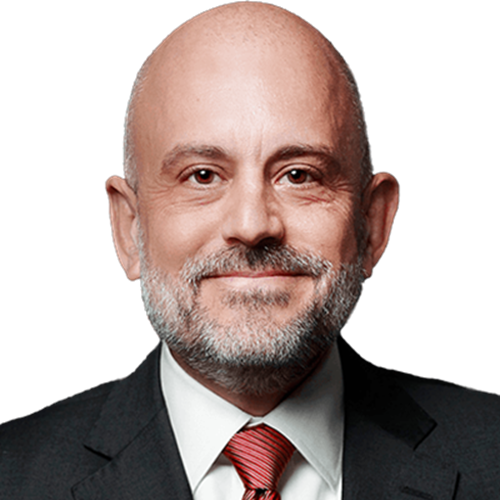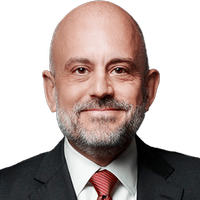Why I'm Not a Fan of 401(k)s
Watch out: Saving money in 401(k)s, 403(b)s and 457 plans is like throwing that money in jail.

Profit and prosper with the best of Kiplinger's advice on investing, taxes, retirement, personal finance and much more. Delivered daily. Enter your email in the box and click Sign Me Up.
You are now subscribed
Your newsletter sign-up was successful
Want to add more newsletters?

Delivered daily
Kiplinger Today
Profit and prosper with the best of Kiplinger's advice on investing, taxes, retirement, personal finance and much more delivered daily. Smart money moves start here.

Sent five days a week
Kiplinger A Step Ahead
Get practical help to make better financial decisions in your everyday life, from spending to savings on top deals.

Delivered daily
Kiplinger Closing Bell
Get today's biggest financial and investing headlines delivered to your inbox every day the U.S. stock market is open.

Sent twice a week
Kiplinger Adviser Intel
Financial pros across the country share best practices and fresh tactics to preserve and grow your wealth.

Delivered weekly
Kiplinger Tax Tips
Trim your federal and state tax bills with practical tax-planning and tax-cutting strategies.

Sent twice a week
Kiplinger Retirement Tips
Your twice-a-week guide to planning and enjoying a financially secure and richly rewarding retirement

Sent bimonthly.
Kiplinger Adviser Angle
Insights for advisers, wealth managers and other financial professionals.

Sent twice a week
Kiplinger Investing Weekly
Your twice-a-week roundup of promising stocks, funds, companies and industries you should consider, ones you should avoid, and why.

Sent weekly for six weeks
Kiplinger Invest for Retirement
Your step-by-step six-part series on how to invest for retirement, from devising a successful strategy to exactly which investments to choose.
Employees love their 401(k)s, but love can be blind. These plans are riddled with traps, restrictions and caveats that are not apparent until you attempt to access your money out of the plan. Retirement savers need to open their eyes to some serious flaws built into these accounts.
A 401(k) is a type of employer-sponsored retirement savings plan utilized in for-profit organizations. Related types of plans are the 403(b), used in not-for-profit and education, and 457 plans, designed for government employees. While all different, each is categorized as the same type of plan, designed for participants to save for retirement.
First, the Good
The good news with these accounts is that they are an easy way to save for retirement. Through payroll deductions, you can set a percentage to be taken from your paycheck and deposited into the plan for your retirement. Often this contribution can be tax deductible, reducing your current year tax liability.
From just $107.88 $24.99 for Kiplinger Personal Finance
Become a smarter, better informed investor. Subscribe from just $107.88 $24.99, plus get up to 4 Special Issues

Sign up for Kiplinger’s Free Newsletters
Profit and prosper with the best of expert advice on investing, taxes, retirement, personal finance and more - straight to your e-mail.
Profit and prosper with the best of expert advice - straight to your e-mail.
Some plans even offer a matching contribution, which means that your employer will contribute into the plan, equal to your contribution, up to certain predefined limits that are set by the employer.
Now, the Bad
While these plans are popular, there is an inherent problem with them. You relinquish control of your money until specific triggering events grant you permission to access your money from the plan. Once deposited into the account, your money is serving a proverbial jail sentence.
Here are three triggering events that grant you permission to escape:
- You leave your current employer. Whether you retire, quit or are fired from a job, separation from an employer is a triggering event that allows you to move money out of the plan. Of course, that doesn’t mean you can just pull all your money out of the plan without the possibility of incurring taxes or penalties.
- You reach age 59½. For some plans, reaching the age of 59½ is a triggering event that allows you to move money out of the plan. However, not all plans offer this as an option.
- You have a qualifying hardship. If your employer allows them, there are a few life events or circumstance that allow money to be taken out of the plan, such as certain medical expenses or buying a home. If you elect to use this option, keep in mind that you may be subject to a 10% penalty and tax liabilities.
A few things to think about when it comes to tying your money up in these plans:
- Distributions from a 401(k) are subject to an early withdrawal penalty of 10% prior to age 55 if you are separated from employment (59½ if still “in service” with your employer).
- You have very limited access to the money while you remain employed, including taking a 401(k) loan — something that’s more of a last resort than anything else.
- For tax-deferred 401(k) plans, you are eventually forced to take your money out through required minimum distributions (RMDs) whether you need it or not. (The IRS enforces a required minimum distribution (RMD) if you reached 70½ in 2019. For those reaching 70½ in 2020, and beyond that the new RMD age is 72 thanks to the Secure Act.)
So, overall, these savings plans can be very restrictive. The act of giving up control of your money can limit your ability to fulfill important life events, and it’s seldom in your best interest to do so.
The bottom line is that the rules for these plans are set and regulated by our government, and they don’t always coincide with your needs.
You’re Kicking the Tax Can Down the Road
Another problem with these plans is that you may misunderstand the actual benefits they provide. When it comes to contributions, you may believe you are saving on taxes because you are receiving a tax deduction in the year the funds are contributed. However, you are merely deferring taxes. A tax deduction through deferral is not the same as a tax savings. In other words, you either pay taxes now or you pay them later. A true tax savings is something you can write off on your taxes to receive the deduction with no future liabilities. With these plans, you are simply deferring taxes to a later point in time when the liabilities await you.
Example: You contribute $10,000 a year into your 401(k), deducting the contribution from your current year taxes. Assuming a hypothetical 8% annual rate of return over 30 years you would accumulate $1,223,000. Since the $10,000 a year you put into the plan was tax-deductible (you didn’t pay any taxes on the money contributed or the growth) the entire account balance is subject to tax.
So, a few things to think about when it comes to the tax liabilities:
- You are deferring the tax liability to a point in the future when you have no idea what the tax rate will be.
- When you retire you will likely not have the same amount of total tax deductions as you do today. Deductions may include the 401(k) contributions themselves, child credits, other deductions along with home mortgage interest, etc.
- The IRS does not offer a different tax code for retirees. You have the same tax brackets when you retire as you do while you are working. Granted, you may have less income in retirement, which could move you to a lower tax bracket, but reducing your income is not a goal worth pursuing.
The bottom line is that our focus needs to be on how money will be used and structure a plan around receiving the tax benefits at the point money will be used. Postponing taxes for when you need the money can leave you overexposed to tax liabilities later in life.
When a 401(k) Makes Sense
If you haven’t figured it out yet, I am not a fan of 401(k)s. However, there are a couple of exceptions … with caveats:
- If an employer offers matching contributions to your 401(k), it may make sense to contribute to the plan to receive the company match, but only in conjunction with other non-qualified accounts mentioned below. You never want to tie all your money up into these plans, regardless of a match.
- Some plans offer a Roth 401(k) option. If this is the case, opt for your contributions to go here even though they will not be tax deductible. The advantage is that the money will grow tax-free and doesn’t have the same tax complications down the road. However, the fact still remains that a 401(k) is restrictive and does not offer the same flexibility that other programs offer.
One of the primary reasons people contribute to their 401(k)s is out of convenience. We most often opt for the easier, more popular option when it comes to making decisions, which doesn’t necessarily mean it is best. McDonald’s says it serves “billions,” but we all know eating there is not good for our health.
Some Other Options to Consider
Another reason people use 401(k)s is the fact that they don’t understand there are other options. There are better options to save for the future that include more access and control over your money, depending on your situation.
Consider the following:
- A Roth IRA has no deduction for contributions but offers tax-free growth for retirement. These plans are different from employer-sponsored plans, since you are considered the owner. These plans do carry restrictions, but you always maintain access to the money, though taxes and penalties may apply.
- A non-qualified investment account, such as a brokerage account, can help manage tax liabilities, while allowing you access and control of the funds. That means you are free to access and use the money as you choose with no government oversight or penalties.
- A specially designed life insurance contract is a high cash value policy that offers access to the account value through loans or withdrawals. Policies have no tax deduction on contributions but do have favorable tax treatment by the IRS. These plans also provide you with easy access to cash at any age without penalties.
These options can work well and provide a more flexible alternative to employer plans when used in the right situations.
Just keep in mind that there are no unicorns, and there is no perfect investment. There are positives and negatives for every decision you make. However, one thing is certain: When considering where to store your money, having access and control of your money is paramount.
Securities offered through Kalos Capital, Inc., Member FINRA/SIPC/MSRB and investment advisory services offered through Kalos Management, Inc., an SEC registered Investment Advisor, both located at11525 Park Wood Circle, Alpharetta, GA 30005. Kalos Capital, Inc. and Kalos Management, Inc. do not provide tax or legal advice. Skrobonja Financial Group, LLC and Skrobonja Insurance Services, LLC are not an affiliate or subsidiary of Kalos Capital, Inc. or Kalos Management, Inc.
Securities offered only by duly registered individuals through Madison Avenue Securities, LLC. (MAS), Member FINRA & SIPC. Advisory services offered only by duly registered individuals through AE Wealth Management (“AEWM”), a registered investment adviser. Skrobonja Financial Group, LLC, Skrobonja Insurance Services, LLC, AEWM and MAS are not affiliated entities. The article and opinions in this publication are for general information only and are not intended to provide specific advice or recommendations for any individual. We suggest that you consult your accountant, tax or legal adviser with regard to your individual situation.
Profit and prosper with the best of Kiplinger's advice on investing, taxes, retirement, personal finance and much more. Delivered daily. Enter your email in the box and click Sign Me Up.

Brian Skrobonja is a Chartered Financial Consultant (ChFC®) and Certified Private Wealth Advisor (CPWA®), as well as an author, blogger, podcaster and speaker. He is the founder and president of a St. Louis, Mo.-based wealth management firm. His goal is to help his audience discover the root of their beliefs about money and challenge them to think differently to reach their goals. Brian is the author of three books, and his Common Sense podcast was named one of the Top 10 podcasts by Forbes. In 2017, 2019, 2020, 2021 and 2022, Brian was awarded Best Wealth Manager. In 2021, he received Best in Business and the Future 50 in 2018 from St. Louis Small Business.
-
 Nasdaq Leads a Rocky Risk-On Rally: Stock Market Today
Nasdaq Leads a Rocky Risk-On Rally: Stock Market TodayAnother worrying bout of late-session weakness couldn't take down the main equity indexes on Wednesday.
-
 Quiz: Do You Know How to Avoid the "Medigap Trap?"
Quiz: Do You Know How to Avoid the "Medigap Trap?"Quiz Test your basic knowledge of the "Medigap Trap" in our quick quiz.
-
 5 Top Tax-Efficient Mutual Funds for Smarter Investing
5 Top Tax-Efficient Mutual Funds for Smarter InvestingMutual funds are many things, but "tax-friendly" usually isn't one of them. These are the exceptions.
-
 Social Security Break-Even Math Is Helpful, But Don't Let It Dictate When You'll File
Social Security Break-Even Math Is Helpful, But Don't Let It Dictate When You'll FileYour Social Security break-even age tells you how long you'd need to live for delaying to pay off, but shouldn't be the sole basis for deciding when to claim.
-
 I'm an Opportunity Zone Pro: This Is How to Deliver Roth-Like Tax-Free Growth (Without Contribution Limits)
I'm an Opportunity Zone Pro: This Is How to Deliver Roth-Like Tax-Free Growth (Without Contribution Limits)Investors who combine Roth IRAs, the gold standard of tax-free savings, with qualified opportunity funds could enjoy decades of tax-free growth.
-
 One of the Most Powerful Wealth-Building Moves a Woman Can Make: A Midcareer Pivot
One of the Most Powerful Wealth-Building Moves a Woman Can Make: A Midcareer PivotIf it feels like you can't sustain what you're doing for the next 20 years, it's time for an honest look at what's draining you and what energizes you.
-
 I'm a Wealth Adviser Obsessed With Mahjong: Here Are 8 Ways It Can Teach Us How to Manage Our Money
I'm a Wealth Adviser Obsessed With Mahjong: Here Are 8 Ways It Can Teach Us How to Manage Our MoneyThis increasingly popular Chinese game can teach us not only how to help manage our money but also how important it is to connect with other people.
-
 Looking for a Financial Book That Won't Put Your Young Adult to Sleep? This One Makes 'Cents'
Looking for a Financial Book That Won't Put Your Young Adult to Sleep? This One Makes 'Cents'"Wealth Your Way" by Cosmo DeStefano offers a highly accessible guide for young adults and their parents on building wealth through simple, consistent habits.
-
 Global Uncertainty Has Investors Running Scared: This Is How Advisers Can Reassure Them
Global Uncertainty Has Investors Running Scared: This Is How Advisers Can Reassure ThemHow can advisers reassure clients nervous about their plans in an increasingly complex and rapidly changing world? This conversational framework provides the key.
-
 I'm a Real Estate Investing Pro: This Is How to Use 1031 Exchanges to Scale Up Your Real Estate Empire
I'm a Real Estate Investing Pro: This Is How to Use 1031 Exchanges to Scale Up Your Real Estate EmpireSmall rental properties can be excellent investments, but you can use 1031 exchanges to transition to commercial real estate for bigger wealth-building.
-
 Should You Jump on the Roth Conversion Bandwagon? A Financial Adviser Weighs In
Should You Jump on the Roth Conversion Bandwagon? A Financial Adviser Weighs InRoth conversions are all the rage, but what works well for one household can cause financial strain for another. This is what you should consider before moving ahead.
